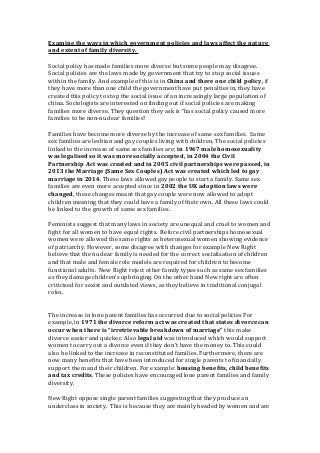
government policies that affect family diversity.
- 1. Examine the ways in which government policies and laws affect the nature and extent of family diversity. Social policy has made families more diverse but some people may disagree. Social policies are the laws made by government that try to stop social issues within the family. And example of this is in China and there one child policy, if they have more than one child the government have put penalties in, they have created this policy to stop the social issue of an increasingly large population of china. Sociologists are interested on finding out if social policies are making families more diverse. They question they ask is “has social policy caused more families to be non-nuclear families? Families have become more diverse by the increase of same sex families. Same sex families are lesbian and gay couples living with children. The social policies linked to the increase of same sex families are; in 1967 male homosexuality was legalised so it was more socially accepted, in 2004 the Civil Partnership Act was created and in 2005 civil partnerships were passed, in 2013 the Marriage (Same Sex Couples) Act was created which led to gay marriage in 2014. These laws allowed gay people to start a family. Same sex families are even more accepted since in 2002 the UK adoption laws were changed, these changes meant that gay couple were now allowed to adopt children meaning that they could have a family of their own. All these laws could be linked to the growth of same sex families. Feminists suggest that many laws in society are unequal and cruel to women and fight for all women to have equal rights. Before civil partnerships homosexual women were allowed the same rights as heterosexual women showing evidence of patriarchy. However, some disagree with changes for example New Right believe that the nuclear family is needed for the correct socialisation of children and that male and female role models are required for children to become functional adults. New Right reject other family types such as same sex families as they damage children’s upbringing. On the other hand New right are often criticised for sexist and outdated views, as they believe in traditional conjugal roles. The increase in lone parent families has occurred due to social policies For example, in 1971 the divorce reform act was created that states divorce can occur when there is “irretrievable breakdown of marriage” this make divorce easier and quicker. Also legal aid was introduced which would support women to carry out a divorce even if they don’t have the money to. This could also be linked to the increase in reconstituted families. Furthermore, there are now many benefits that have been introduced for single parents to financially support them and their children. For example: housing benefits, child benefits and tax credits. These policies have encouraged lone parent families and family diversity. New Right oppose single parent families suggesting that they produce an underclass in society. This is because they are mainly headed by women and are
- 2. dependent welfare. However, feminists would believe this to be sexist as it suggests women cannot successfully bring up children without a man. They suggest that the benefits that women receive as single parents can help them escape domestic violence and abusive relationships. A single parent environment could be far better for a child than a nuclear family where domestic violence occurs by a man. In contrast to social policy encouraging family diversity some sociologists would believe social policy encourages the nuclear family and discourages diversity. For example, marriage laws in the UK only allow you to marry one person, encouraging the nuclear family. Furthermore, the coalition government want to introduce a married person tax allowance to encourage marriage and the nuclear family. Also the child benefit system encourages the nuclear family by penalising single parents. As a single parent earning over £44,000 will no longer receive the benefit whereas a couple earning £80,000 between them still will. In conclusion, even though some policies have tried to encourage the nuclear family the majority of social policies have caused diversity.